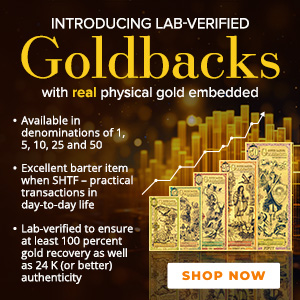
President of eMarketing Association, Robert Fleming, discusses e-marketing certification and the current state of spam
 Friday, June 02, 2006 Friday, June 02, 2006by Mike Adams, the Health Ranger Editor of NaturalNews.com (See all articles...) Tags: e-marketing, spam, CAN-SPAM |
- Newly released JFK files reveal Pentagon's role in creating Lyme disease and covid in the same lab
- Woman contracts WORLD'S DEADLIEST VIRUS after unknowingly being given the WRONG VACCINE
- Kiss Your Genetic Privacy Good-Bye! 23andMe Gets Green Light to Sell Your Intimate Genetic Details to Anyone They Want
- AI weather model outperforms traditional forecasts, boosts accuracy by 20%
- Sweden's migrant crisis deepens as failed green energy venture leaves thousands jobless, exposes systemic collapse
- Revolutionize your diet with pomegranate: The miracle juice for gut health and metabolism
- Advisory: Ex-FBI agent exposes likely ATF honeypot operation selling illegal Glock switches
- The case for locking up the Deep State's biggest hatchet man...
- Pediatric dentist exposes fluoride dangers as more states ban toxic water additive
- North Carolina Supreme Court rules family can sue over COVID-19 force-vaccination of teen without parental consent
- Analysis: The coming economic collapse, a mass uprising and Trump's three secret weapons to halt the growing revolt
- Could camel milk be a game-changer for autism? Science says it’s worth exploring
- DHS Secretary Kristi Noem plans to dismantle FEMA
- U.K. unveils controversial pandemic preparedness tool: A double-edged sword?
- NIH to crack down on taxpayer-funded censorship: A victory for academic freedom
- At least 75 percent of Americans are unknowingly MEDICATED FOR STUPIDITY by fluoridated water – Utah now banning it
- Ann Vandersteel on the Health Ranger Report: Operation Burning Edge, the dollar empire’s collapse and the rebirth of America’s sovereignty
- We are closer to all-out war in Europe, in Asia, and in the Middle East than most people realize
- Newly released JFK files reveal Pentagon's role in creating Lyme disease and covid in the same lab
- Analysis: The coming economic collapse, a mass uprising and Trump's three secret weapons to halt the growing revolt
- Trump nominates VACCINE ZEALOT Susan Monarez to lead the CDC, sidelining RFK Jr.'s reform efforts
- Trump's greatest betrayal so far: Accelerating Middle East wars, silencing dissent, and serving Zionist masters
- CDC finally halts $11 billion COVID funding scam as health officials admit the ‘pandemic’ was a fraud
- The hidden dangers in your kitchen: How cooking methods impact diabetes, cancer and aging
- BEWARE: USDA allows genetically engineered vaccines to infiltrate organic food production
- Obama accused of laundering USAID funds to fuel global protest movements, regime change operations
- DEADLY DECEPTION: How COVID vaccines increased mortality rates and why authorities hid the truth
- Here are TEN all-natural ways to protect your garden without using harmful chemicals
- Dr. Mike Yeadon releases 15-minute testimony - WATCH - about genocidal intent of COVID “vaccines”
- Festive flavors: The sweet history, nutritional profile and health benefits of pecan pie
- Big Pharma's media takeover: How drug companies bought the news - and your health
- Dr. Suzanne Humphries makes bombshell appearance on Joe Rogan podcast, exposing vaccine industry deception back to POLIOMYELITIS
- Elon Musk: Aliens could be here on Earth RIGHT NOW
- 5 Simple steps to boost your brainpower: How to strengthen executive function in a distracted world
- Trump reverses course on Gaza plan, says “nobody is expelling Palestinians”
- California's social media censorship law struck down: A victory for free speech or a threat to online safety?
- Newly released JFK files reveal Pentagon's role in creating Lyme disease and covid in the same lab
- EPA advisor admits the agency is funneling billions to climate groups ahead of Trump’s return to White House
- California's social media censorship law struck down: A victory for free speech or a threat to online safety?
- Dr. Mike Yeadon releases 15-minute testimony - WATCH - about genocidal intent of COVID “vaccines”
- The Health Ranger releases “Vaccine Zombie” song and music video, using AI-animated zombies for the music video
- Florida takes a stand: DeSantis proposes permanent ban on mRNA vaccine mandates
- The pandemic as a tool for INDOCTRINATION: Understanding “The Indoctrinated Brain” by Dr. Michael Nehls
- “Why we influenced the 2020 elections”: Facebook files reveal the coordinated effort to bury the Hunter Biden laptop story
- Mike Adams releases country western hit single: Goin’ Back in Time is Comin’ Home
- Mike Adams releases music poetry sensation: A Child of God
- Unpacking the Lies That We’ve Been Fed – new song and music video released by Mike Adams, the Health Ranger
- Michigan sheriff announces criminal investigation into 2020 election crimes, Dominion Voting Systems
- Migrants are taking advantage of recent hurricanes to scam residents and loot their homes
- House Intelligence Committee calls for the ARREST and PROSECUTION of Dr. Anthony Fauci
- Rep. Nancy Mace introduces bill to ban biological males from female facilities on federal property
- Peter Rost exposes Big Pharma corruption in his book “The Whistleblower: Confessions of a Healthcare Hitman”
- Former horse rancher and 6,000 other plaintiffs are suing Syngenta after paraquat exposure led to Parkinson's Disease
- Mike Adams releases new song and music video: Nothing More Disgusting Than a Globalist
- Red Cross issues warning to stop blood plasma donations from vaccinated people
- Scientists confirm: GENIUS brain function can be spontaneously unleashed in humans without any apparent cause
- EPA advisor admits the agency is funneling billions to climate groups ahead of Trump’s return to White House
- HYSSOP: What research reveals about the health benefits of this ancient holy herb
- Two containers with completed ballots fall out of truck in Florida
- Fully vaccinated about to see “tsunami” of illness and death, warns virologist
- Global leaders unite to clamp down on “misinformation” with UN-backed Cascais Declaration
- BREAKING: 2025 NDAA authorizes mandatory military draft of WOMEN across America… as Pentagon pursues global NUCLEAR war with both Russia and China at the same time
- Michael Yon warns of a ZIONIST TAKEOVER in Trump’s second administration
- BOMBSHELL: DNA testing kits are a SCAM to develop ethnic-specific bioweapons
- Ozempic and Wegovy weight loss drugs are injectable LIZARD VENOM PEPTIDES that may unleash a devastating wave of organ failure… side effects align with symptoms of SNAKE BITES
- Israeli soldiers accused of even more torture and abuse in the West Bank
- These 13 countries just signed an agreement to engineer a global FAMINE by destroying food supply
- NASA admits that climate change occurs because of changes in Earth’s solar orbit, and NOT because of SUVs and fossil fuels
- RFK Jr. clears key hurdle: Sen. Susan Collins backs controversial HHS nominee, signaling a new era for health policy
- Sermon 30: How Jesus reveals Caesar’s FAKE CURRENCY and FALSE AUTHORITY
- Coriander seeds: Ancient medicine backed by modern science
- Arizona officials claim Maricopa County needs 10-13 days to tabulate results of the election
Robert Fleming: The eMA was founded in 1998. Basically, our mission is to educate and bring together people in the e-marketing, internet marketing arena and provide resources and opportunities for those people to network and develop the field. It's a very new area in marketing. In many ways, a lot of the old rules are turned on their heads.
We have the most recognized certification in the world for e-marketers. These are important since colleges are not giving degrees in e-marketing or e-commerce. Most of the people who have experience in that have gained it on their own. The certification demonstrates to prospective employers and clients that people do indeed have an understanding of mechanisms, processes, techniques and procedures for marketing on the internet.
It's a very popular certification, the only such certification endorsed by a governor and state board of education. It's offered in 300 colleges around the world in 30 countries.
Mike: When you say it's offered in these 300 colleges, are they offering your courses?
Fleming: They offer our certification, not courses. We offer online courses, but they are separate and distinct from a certification. The courses are designed to train and to educate people on things like email search engines and optimization, web site marketing and so on. The certification is designed to demonstrate competency.
It's not an educational vehicle. If you already have the education but you need a credential in order to demonstrate to clients and to potential customers or even your employer, then a certification is what you would need. If you're looking to get an education, then you could take one of our online courses. There are other courses out there.
Mike: What are the big areas that you cover? Web, email and search engines?
Fleming: We cover email, search engines, web marketing and integration. I think those four issues are the strongest topics.
Mike: What seems to be the most popular area of focus?
Fleming: Email.
Mike: Interesting.
Fleming: Personally, I think that website marketing should be more important than email. It's like the store. If you don't build the store right, you don't build the website for e-commerce properly, especially if the navigation isn't good or the graphics aren't good.
Mike: Right.
Fleming: Email is so widespread, and there is so much spam, and that's such a large issue. That's the hottest issue with e-marketers, along with search engine optimizations. Eighty percent of the people who get to your site get there through one search engine or another.
Mike: It seems like you would need to sort of reinvent your curriculum or update it quite frequently?
Fleming: We update our curriculum about once every six months. There's always new legislation coming up. There are always things to learn. A couple of years ago, pop-ups were a very efficient way of click-throughs and making money. Today, there's a million blockers, and it's very unpopular. So there's a lot of turbulence within this arena, and we're learning. Everybody's learning. We're just learning about spyware, now we see legislation against it.
Mike: If a new student comes to you for your courses on your popular marketing course section, what is it that they are going to learn and take away from that?
Fleming: They're going to go through a four-week intensive course, which consists of five lessons and five tests that are instructor-monitored. One of the interesting things we do is have a live instructor that interacts with students. He works full time. He deals with 150 to 200 students a month, and that's all he does. They get lessons online. They'll have five tests and a final exam and at the end of the course, and they'll get a certificate. They'll also be supplied with resources, handbooks and PDF files during the progress of the course. We don't hand them a CD-ROM, as in some cases, or put them into an automated education system.
So, if a student emails an instructor during daytime hours, during instruction hours, they'll get a response back from him generally in five minutes.
Mike: It seems like the best way to do an online education. I mean, you can't just leave it up to a web-based test system to teach somebody.
Fleming: Right. There are some that do that. Let me caution people: If you're going to take a web-based course, you have to have some amount of self-discipline. You have to be ready to invest some time into it. We explain that on our website. Many, many people do well in it. A lot of our corporate members, like DoubleClick, Yahoo and Microsoft, put employees through courses and marketing departments.
Mike: What about the topics? What are they going to cover in email marketing courses?
Fleming: They're going to cover basic things -- like HTML versus text, how to acquire email lists, how to clean them, how to use those databases and how to collect demographic, psychographic and geographic information and coordinate that into an actionable plan. They will also cover newsletter marketing and affiliate marketing through email.
Mike: What do you think are the big trends in spam? What's happening out there?
Fleming: Prior to the CAN-SPAM Act, there were a lot of state laws that actually made spam illegal. The CAN-SPAM Act simply said, "Well, you can go ahead and send all the spam you want, as long as you have three things in place. You have an address, you have a way for people to opt out and you respect that." That's about it. We actually saw a huge increase in spam this year, which is unfortunate. I think, eventually, we're going to see that go away on its own. It costs too much to send spam if you do it through legitimate spam lists. I think that the problem will eventually resolve itself. The reasons you get so much spam is that about 80 percent of it goes through hijacked computers.
Mike: How is the cost for spammers going to rise?
Fleming: Eighty-five percent of the spam you get is not sent through conventional bandwidth. In other words, when you send out email, you have to pay for bandwidth. You have to pay to send that out. A lot of spam is sent illegally through hijacked computers, which is where hackers get into computers and use open SMTP ports to get mail out. It costs them absolutely nothing for the bandwidth.
Some of the larger spammers that I've looked at were citing $20,000 to 30,000 a month to pay for their operations in terms of bandwidth, phone lines and cable lines.
Mike: Won't spammers always be able to find these zombie PCs?
Fleming: I hope not. That's really a technical issue, but no. I think the ability for people to hijack bandwidth will, by necessity, be closed eventually.
People are using different spam filters. There are solutions, and I think it's something that we just need to get through. It's unfortunate that it's out there, and certainly we're vehemently against it because it undermines e-commerce. The fault lies especially with these people who are fraudulently going after people's bank accounts through identity theft. When you think about it, it just underscores the fact that this is a very important thing for business to understand and to work with.
Mike: Right. There's been a lot of attention paid this past year to staying compliant with CAN-SPAM. But, as you mentioned, even the spammers aren't compliant.
Fleming: Well, they are in terms of sending out spam. The tough part of compliance is opting out. That means Acme Corporation has got to take them off the list by law. But it's also got to take them off of all of their partner lists.
If one of their salesmen happens to go to a convention and get somebody's email address that had opted out and send them a friendly follow-up email, even though it's kind of personal, then they're going to be in violation of that act. So, there are some issues with the opt-out provisions of the law that are difficult for corporations to implement.
Mike: Indeed.
Fleming: A lot of corporations give their lists. That list falls across several divisions or several other companies, and you've got to be opted out of all of them. But as far as sending email, that's very easy. All they say is identify it and make sure it comes from a legitimate source that's your address, then send all the email you want.
Mike: There also seems to be a trend today of shifting back toward plaintext email, because of problems with HTML compatibility and images loading up. What's your take on that?
Fleming: We are seeing response shifts in business emailers, who are seeing higher click-through rates in plaintext versus HTML. We haven't seen that as much in consumers. People are getting a little wary about clicking on anything. Even like an opt-out. Because of some of these viruses and other negative things, people don't necessarily like to click on things in emails they're not comfortable with. Plus, plaintext takes up a lot less bandwidth. It loads faster. I don't think emails should link the sales messages anyway. They should basically say, "Okay, here's a message, and here's a link where you can go to find out more." If you don't want to click on the link, the address should be simple enough so that you can just put it in your browser yourself.
Mike: Sure. The website where people should go to find this information is www.emarketingassociation.com?
Fleming: Yes. It's www.emarketingassociation.com.
Mike: What's the general price range of these courses?
Fleming: $79 to $99.
Mike: Quite affordable, then.
Fleming: Exactly. The average online course is probably right around $279, so we're running about 66 percent less. One of the courses is free with the membership, and that's the basic course, so people who join the association generally will go through the free course.
Mike: Well, thank you for your time, Robert. I appreciate it.
Fleming: Well, thank you!
E-marketing at FETCH.news
Get independent news alerts on natural cures, food lab tests, cannabis medicine, science, robotics, drones, privacy and more.
 About the author:Mike Adams (aka the "Health Ranger") is a best selling author (#1 best selling science book on Amazon.com) and a globally recognized scientific researcher in clean foods. He serves as the founding editor of NaturalNews.com and the lab science director of an internationally accredited (ISO 17025) analytical laboratory known as CWC Labs. There, he was awarded a Certificate of Excellence for achieving extremely high accuracy in the analysis of toxic elements in unknown water samples using ICP-MS instrumentation. Adams is also highly proficient in running liquid chromatography, ion chromatography and mass spectrometry time-of-flight analytical instrumentation.
About the author:Mike Adams (aka the "Health Ranger") is a best selling author (#1 best selling science book on Amazon.com) and a globally recognized scientific researcher in clean foods. He serves as the founding editor of NaturalNews.com and the lab science director of an internationally accredited (ISO 17025) analytical laboratory known as CWC Labs. There, he was awarded a Certificate of Excellence for achieving extremely high accuracy in the analysis of toxic elements in unknown water samples using ICP-MS instrumentation. Adams is also highly proficient in running liquid chromatography, ion chromatography and mass spectrometry time-of-flight analytical instrumentation.
Adams is a person of color whose ancestors include Africans and Native American Indians. He's also of Native American heritage, which he credits as inspiring his "Health Ranger" passion for protecting life and nature against the destruction caused by chemicals, heavy metals and other forms of pollution.
Adams is the founder and publisher of the open source science journal Natural Science Journal, the author of numerous peer-reviewed science papers published by the journal, and the author of the world's first book that published ICP-MS heavy metals analysis results for foods, dietary supplements, pet food, spices and fast food. The book is entitled Food Forensics and is published by BenBella Books.
In his laboratory research, Adams has made numerous food safety breakthroughs such as revealing rice protein products imported from Asia to be contaminated with toxic heavy metals like lead, cadmium and tungsten. Adams was the first food science researcher to document high levels of tungsten in superfoods. He also discovered over 11 ppm lead in imported mangosteen powder, and led an industry-wide voluntary agreement to limit heavy metals in rice protein products.
In addition to his lab work, Adams is also the (non-paid) executive director of the non-profit Consumer Wellness Center (CWC), an organization that redirects 100% of its donations receipts to grant programs that teach children and women how to grow their own food or vastly improve their nutrition. Through the non-profit CWC, Adams also launched Nutrition Rescue, a program that donates essential vitamins to people in need. Click here to see some of the CWC success stories.
With a background in science and software technology, Adams is the original founder of the email newsletter technology company known as Arial Software. Using his technical experience combined with his love for natural health, Adams developed and deployed the content management system currently driving NaturalNews.com. He also engineered the high-level statistical algorithms that power SCIENCE.naturalnews.com, a massive research resource featuring over 10 million scientific studies.
Adams is well known for his incredibly popular consumer activism video blowing the lid on fake blueberries used throughout the food supply. He has also exposed "strange fibers" found in Chicken McNuggets, fake academic credentials of so-called health "gurus," dangerous "detox" products imported as battery acid and sold for oral consumption, fake acai berry scams, the California raw milk raids, the vaccine research fraud revealed by industry whistleblowers and many other topics.
Adams has also helped defend the rights of home gardeners and protect the medical freedom rights of parents. Adams is widely recognized to have made a remarkable global impact on issues like GMOs, vaccines, nutrition therapies, human consciousness.
In addition to his activism, Adams is an accomplished musician who has released over a dozen popular songs covering a variety of activism topics.
Click here to read a more detailed bio on Mike Adams, the Health Ranger, at HealthRanger.com.
Take Action: Support Natural News by linking to this article from your website
Permalink to this article:
Embed article link: (copy HTML code below):
Reprinting this article:
Non-commercial use OK, cite NaturalNews.com with clickable link.
Follow Natural News on Facebook, Twitter, Google Plus, and Pinterest
Science News & Studies
Medicine News and Information
Food News & Studies
Health News & Studies
Herbs News & Information
Pollution News & Studies
Cancer News & Studies
Climate News & Studies
Survival News & Information
Gear News & Information
News covering technology, stocks, hackers, and more



"Big Tech and mainstream media are constantly trying to silence the independent voices that dare to bring you the truth about toxic food ingredients, dangerous medications and the failed, fraudulent science of the profit-driven medical establishment.
Email is one of the best ways to make sure you stay informed, without the censorship of the tech giants (Google, Apple, Facebook, Twitter, YouTube, etc.). Stay informed and you'll even likely learn information that may help save your own life."
–The Health Ranger, Mike Adams













































